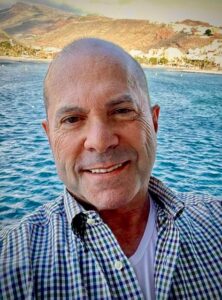
“Garrett, you’re coming out today.”
It was December 5th, 1994, almost thirty years ago. First thing Monday morning, and not what I was expecting. The person making that declaration, calmly and with a smile, was my boss’ boss, someone I very much liked, Carole Black, the president and general manager of the big, important TV station where I worked, KNBC-TV Channel 4 in Los Angeles. Owned by NBC, it has the second largest TV market in the nation: 48,000 square miles of coverage area in five counties, with an audience of more than nine million.
I was considered “talent,” appearing on the station’s Channel 4 News each weekday afternoon, anchoring the four minute ‘Show Business” news segment. I worked hard to get the gig, spending nineteen years in TV newsrooms around the country. I figured I’d eventually bring up the idea of coming out to upper management at Channel 4, but not right away. I didn’t want to push too hard, I’d already pissed off a number of news managers earlier in my career for all kinds of reasons; usually, I was too vocal with my opinions about their ideas.
“They’re not interested in your judgments about their newscast,” a friend reminded me when I worked in Virginia. Ever since, I made it a point to keep opinions to myself and remain on my best behavior.
That’s when the Los Angeles Times called:
“Hi Garrett. We want to profile you as one of the few out, gay TV news people in the country.”
“Great,” I said, thinking that I could use the publicity. Maybe it would raise my name recognition, or get me a raise on my next contract. So, I said, “Let’s do it!
When the Times story appeared, it couldn’t have been better; it was complimentary to me and the station. But a small point made in at the end of it, as if an afterthought, struck a nerve at the station: “Even at KNBC, Glaser has only been allowed to hint at his orientation on air by using the word ‘us’ instead of ‘them’ when covering the gay community.”
I never brought up the subject of an on-air disclosure to NBC, so station executives had nothing to prohibit. I always figured it was inappropriate for any reporter to make themself a part of the story they were covering; that’s how I was educated. I always felt, and still do, that personal disclosures of any kind within a newscast have to be made sparingly and carefully. Context is everything.
A few days after the profile appeared, the newspaper’s Calendar section had, almost playfully, launched a tiny, recurring blurb on its TV page. Just a few words, asking, “Is Glaser Out Yet?” NBC, aware of its reputation as a diverse and tolerant workplace, was getting tired of the ribbing. Who could blame them?
And three months after the profile was published, the station president asked me to come out on the air as soon as possible.
And so, with management’s full buy-in, on that afternoon’s Channel 4 News broadcast, I worked my coming out announcement into one of the news items I happened to be reading that day. It was a short note on the death of the founder of the Pediatric AIDS Foundation, Elizabeth Glaser (no relation): “As a gay man who’s lost more than a few friends to the virus, I am grateful to Ms. Glaser [no relation]for helping to heighten awareness of AIDS outside the gay and lesbian community.”
Two days later, on December 7th, 1994, the Times reported on my official coming out. It was a short piece titled “Glaser Comes Out,” confirming that I was finally and fully out to hundreds of thousands of Channel 4 News viewers.
What happened at NBC was proof that one never stops coming out. I knew since adolescence that coming out would be a lifelong process. We make the decision to come out to others all the time, typically weighing the positives and negatives before we choose to do it, if we do at all. It is a risk, but a calculated risk. When I was growing up, even in New York City, the answer was almost always, “No way. I cannot come out to this person.” Simply saying, “I’m gay,” or “I’m a homosexual” was enough to get you legally fired, thrown out on to the street by your family, or something much worse.
I always knew how fortunate I was to spend most of my professional life as an “out of the closet” gay man. I worked my way up the ladder for almost two decades in New Jersey, Indiana, Michigan, Virginia, Florida, New York, and California. Certainly, my newsroom colleagues always knew I was gay, but before the LA Times called, I never thought about outing myself on the air during a live newscast. The challenge became integrating that kind of personal revelation into coverage of the news on any given day.
Whenever I needed a reminder of what things were like before Stonewall, I only had to recall my 1982 interview with a Pentecostal minister in Virginia Beach. He told me that the Bible decreed that all homosexuals must be put to death, and he was serious. I chose not to come out to him at that moment, although it certainly would’ve made for a good anecdote. It just so happened that I was in a hurry to get my story on the air that day; ironically, it was about free speech.
Despite moments like that, I always tried to live openly and honestly wherever I worked and lived. Coming out to co-workers could not only get your fired, and legally fired, it could also get you beaten up. Violence against “fags” was treated as a joke in many newsrooms. A friend of mine anchoring in Lansing, Michigan in those days was told he was being let go because “this station will not have a sexual deviate hosting our newscasts.”
I have been in and out of the closet since 1965, when I was twelve years old, entering the eighth grade. That was four years before Stonewall, when being out was rare, even in New York.
When I started in the news business, gay people simply weren’t allowed to be open and honest about themselves. We were still forced to hide. Homosexuality was illegal in 49 of the 50 states. In 1967, the year that I came out to my mom, I was 14.
My first job in radio, right after graduating from college, was in 1975. In those days, fag jokes in newsrooms were the rule, not the exception. And I never felt safe enough in those days to challenge the people telling those jokes.
All these years later, I realize that’s the takeaway: A news reporter can come out on television these days and not lose his job. Newsgathering is a vastly different industry from the one I entered 48 years ago. I hope entry-level reporters today are aware of that and remember it.
Coming out is almost never easy, but the stakes are different now. Out still isn’t cool in many newsrooms and, without a doubt, it still takes guts, but the days are over when homophobes can fire you outright or get you thrown out of your apartment just because you told them the truth.
I’ve been retired since 2009, but I know that TV news reporters are now actually encouraged to come out, even in small, conservative markets. Newsroom managers now want openly gay journalists on their teams, and not solely to improve their coverage of the lives of their gay viewers. Finally, after decades of pain and fear, the business seems to really understand that reporters do better work when they live as their authentic selves. It’s about time.
Garrett holds an M.A. degree in Communication Management from the Annenberg School at the University of Southern California and served on the national board of directors of NLGJA, the Association of LGBTQ journalists, for four years. His memoir, FAIRYBOY, will be released in Spring 2024.








Discussion2 Comments
I worked at NBC in Burbank from 1978 to July 1st, 2003. I remember Garrett but had no idea about his coming out story. I worked in the scenic construction department, so our paths didn’t have much chance of crossing. One day my crew boss just asked me if I was gay. I said yes, is that a problem? He said only if I’d denied it! There were many gay workers in probably every department and life was good! Being ten years older than Garrett, I retired when I hit 60 and now live in Dallas and just celebrated my 80th birthday last April! I’m proud to have Garrett as a member of my family!
Yay! Way to go Larry! I love hearing stories like yours. There were lots of us – and these days, even more are out, of course. Generally, I found the NBC family to be incredibly welcoming.